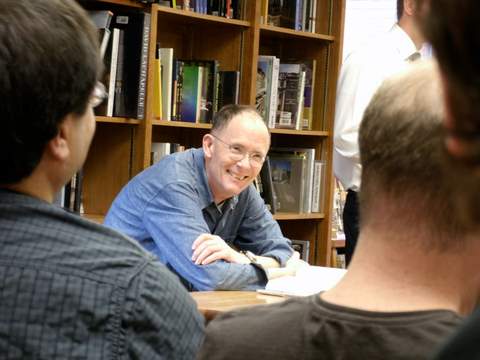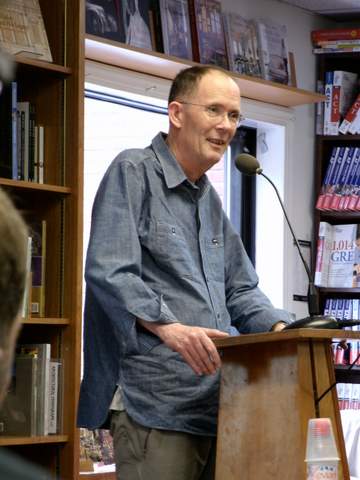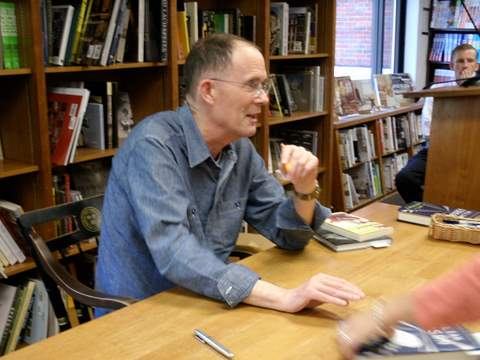William Gibson at P + P
 William Gibson gets to know the crowd William Gibson gets to know the crowd
I saw author William Gibson at a book store signing supporting his new book Zero History. This book is the last of the "Bigend" trilogy, the third Gibson trilogy each of which takes place in a different possible meta space. The Sprawl and Bridge trilogies being the earlier two William Gibson - Wikipedia . The Washington DC stop was at the end of the US leg of the tour supporting the book, and he mentioned a couple of times that he would be glad to be back in Vancouver soon. The book signing took place at Politics and Prose book store. Where virtually every author-in-store event I've attended has been. If I need to buy a book, this is where I'll buy it. Not simply because it's a couple of blocks from my sister Ann's house. It is one of the best book stores I know of. Not the least because it began, grew, and built its reputation precisely at a time when the independent book store was disappearing in most places. It is with profound sorrow that I read of the passing of its founder and co-owner Carla Cohen: Carla Cohen dies; co-founder of D.C. bookstore Politics and Prose. They had announced they were putting the store up for sale in June. I hope still that someone will buy it and continue to run it as the exemplar it is. I only started reading Gibson about a year and a half ago. It was probably when the twenty-fifth anniversary of the publication of Neuromancer came around. I realized that not reading Gibson was a gap and set about acquiring an array of books to bridge that gap. Many years ago in middle and high school I read through Clarke, Asimov, Ellison, Disch, Vonnegut, and Aldiss (I still fondly recall books like Judith Merril's "England swings SF", but after Aldiss I left off reading science fiction returning briefly only to read through Stanislaw Lem. I never read any of the so-called cyperpunk writers of the 80's and 90's at the time.  Reading from Zero History Reading from Zero History
Gibson, after a read-through of a passage from Zero History offered to take questions from the fair sized audience. Many of the initial questions dealt with how he appeared able to describe the future world we are moving into so precisely. Prescient shades of which Nostrodamus predicted he would become jealous of. His short answer was that he wasn't, he doesn't. He describes the present, subsets of the present. Which can resemble the future as they progress outward. He had a sort of codification of this he termed "Science Fiction and the Patina of the Present " The obsolescence of any science fiction novel -- read as prognostication -- as soon as it's written. He referred to seeing the century of science fiction already published as a map of the past. In many cases an unintentional alternative past. My own version of such fanboy questions (which I didn't ask) would be to ask what sort of social milieu he was traveling in when he wrote his first stories and novels. I'm old enough to have a nostalgia, or something akin to one, for that pre world-wide-web (pre Internet dot.com expansion) tech-connect world, and the various types that inhabited it. Maybe another question would be how many people thought of "he took a duck to the face at 250 kts." when Capt. Ches. "You mean this isn't a Boeing 314?" Sullenberger set his plane down in the Hudson. It's hard to ferret that out now He took a duck in the face - Google Search. Gibson had an anecdote about the techie and entrepreneur wannnabe's who came up to him at various events and times back in the mid eighties (and presumably the nineties) with an eye on meeting him as a "lapel pin" of their ascent. "Googleability (Non-googleabilty of certain individuals that is) and the next television," he called it. There was a question from the audience on whether places or character predominate in his fiction. He answered this by pointing out that his "voice" (POV etc.) is limited to that of his chosen "unreliable" narrators presumably also by the chosen locale splinters and the potentiality of observation is frozen by those decisions. The conversation veered into a discussion of Cornell Boxes from All Tomorrows Parties, the last book in the previous trilogy. Cornell boxes are the art work of Joseph Cornell, midcentury American artist and musician. They are intricate though rough-unsophisticated shadowboxes of seeming found objects. The book's plot turned in part on perfect though imitation shadow boxes turning up. I missed how this part the discussion began. The implications of such a device would be commentary on art in the age of mechanical reproduction. Quality of the original object against copies filtered through Gibson's focus on our present culture's growing fetishization of the material object. An outgrowth of advertising and consumerism. The manufacturing paradox I think he called it. Post modern sublime was a phrase he used to describe the marketing of a very real "authentic" line of clothing, relating to a fictional character in a novel of his. Someone asked if he had a background in marketing. He indicated his formal training was in comparative literature, but accepted that his operating nexus was at the balancing point between the world of things and the quality of their irony. He mentioned he had met Naomi Klein and, while he did not think he could take her approach to things, believed they shared a mutual skepticism. There is a Washington Post interview article from the DC stop for his previous book tour which gives a good over-view on what he has been trying to accomplish with his recent novels: Through the Looking Glass,The Post-9/11 Era Has Caught Up With William Gibson's Vision . One of the subjects his recent writing is wrapped around is the idea that for our culture, the western-ish globalizing culture, the future is becoming harder to envision. I don't think this necessarily means that our efforts in science fiction, in popular-technological fulfillment-science writting, will be less accurate -- it could hardly be less so. No, the story here is that our magic eight-ball no matter how much we shake it, keeps telling us through its little window that "the future is cloudy." A particular glide path of transformations is rode out. Perhaps this phase is little more than post-war (WW dot two) optimism rounding back to neutral. All that ad astra enthuzema along it, and the next horizon not yet firmly in sight. But I wouldn't say 11 September 2001 formed any irrecontrovertable demarcation of possible futures. There wasn't anything about September 11th that wasn't in play for a decade and more. Not the groups, politics, religiosity, ideology or tactics. The difference was that it succeeded, and that we interpreted it as the new millennium's opening argument against us.  William Gibson signing books William Gibson signing books
The talk turned to genre fiction and how he is still seen as writing in a genre. As Gibson viewed it, he didn't think genre fiction had any inherent ability to limit a careful writer. It is merely organizing structure, a framework. Genre functions as a ready-made, a loose collection of settings attitudes and tropes the writer can do with what he or she will. A few weeks ago I came across a MetaFilter thread on the topic of genre fiction When Genre Zombies Attack! (while trying to determine whether MetaFilter had ever dealt with David Lindsay). That thread repeatedly made the point that all modern fiction is genre fiction. There is no serious no academic fiction, written by a wide and diverse enough body of writers not to fall into a handful of recognizable forms: genres. He made a comment semi seriously at the end of this about being engaged in a career-long arc to get to the same literary space that Margaret Atwood has gotten to. As the Q and A portion was winding down there was some talk about the Neuromancer movie. He said he had a better feeling about the current effort to bring about a Neuromancer movie than most previous ones. He admitted to sitting through meetings where he was secretly glad the necessary momentum did not seem to be in the room. Above all he cautioned until you see the words "green light" in published print, it's not really happening no matter what all else you read.
11:29:10 PM  ;; ;;
|





